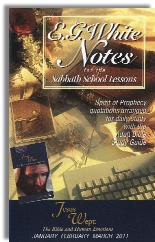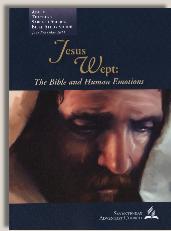|
||||||||||||||
Commentary on "Guilt""
Day 3: Monday, January 24, 2011 - Joseph's Brothers' Distress
Overview
“Each corner of the triangle (God—Others—Me) needs to be worked out in order to bring a resolution to past wrongdoings.” (Teacher’s Quarterly, Page 56)
Problems
Just prior to this quotation the author introduces James 5:16 and 1 John 1:9 as key verses for dealing with guilt. These both are wonderful verses. I believe the author explains James accurately.
As with nearly all other denominations, the author gets 1 John 1:9 wrong. I justify my assertion in two ways. First, Thursday’s lesson talks about total forgiveness. Thursday’s lesson cannot be true if 1 John 1:9 is explained as it is in Monday’s lesson, and vice versa. (See my comments for Thursday)
Second, 1 John 1:9 itself, when taken in context, yields a very different conclusion. Here is the context:
This is the message we have heard from Him and announce to you, that God is Light, and in Him there is no darkness at all. If we say that we have fellowship with Him and yet walk in the darkness, we lie and do not practice the truth; but if we walk in the Light as He Himself is in the Light, we have fellowship with one another, and the blood of Jesus His Son cleanses us from all sin. If we say that we have no sin, we are deceiving ourselves and the truth is not in us. If we confess our sins, He is faithful and righteous to forgive us our sins and to cleanse us from all unrighteousness. If we say that we have not sinned, we make Him a liar and His word is not in us. (1 John 1:5-10 NASB)
Verse 9 is written to those who claim to be without sin (verses 8 and 10). Those who do so have neither the truth nor His word in them. In other words, they are lost. Verse 9 is not written to saved people. Verse 9 is an appeal to lost people to come to salvation by grace through faith.
2 John 1-2 proves this: “The elder to the chosen lady and her children, whom I love in truth; and not only I, but also all who know the truth, for the sake of the truth which abides in us and will be with us forever… (emphasis added).” You cannot be saved (having truth which abides in you and will be with you forever) and be lost (the truth is not in you) at the same time. It must be one or the other.
Notice also that confession does not equal “asking for forgiveness.” Confession simply means to agree with God concerning your sins. Forgiveness is not contingent upon asking; rather, forgiveness is offered by God as a gift. Whether the blessing of forgiveness is realized is contingent upon my accepting it.
Finally, note 1 John 2:12 – “I am writing to you, little children, because your sins have been forgiven you for His name’s sake.” Clearly, this passage is written to saved people, people whose sins have been (not will be) forgiven as a result of their accepting the gospel that saves – the death, burial and resurrection of Jesus (see 1 Corinthians 15).
On the basis of these three passages, and many, many others throughout the New Testament, we can see that because of what Jesus accomplished on the cross and through His resurrection our sins no longer separate us from God. God is not sitting on a swivel chair in His heavenly office facing us when we please Him and turning away from us when we don’t. In fact, it is just the opposite. God constantly is initiating forgiveness and life to us, begging us to accept His offer of reconciliation.
To use 1 John 1:9 as the “Christian bar of soap” is, quite literally, to put God in my debt. He must forgive me. After all, I confessed, so He is required to respond to my initiative. To do this is to act as anti-Christ, the exact heresy John was combating in his letter.
Therefore, there is no triangle, as if God, others and I are equal. No. God initiates forgiveness to me. This is His demonstration of the reality of reconciliation. If I then allow His forgiveness to flow out from me to others then I am demonstrating that same reconciliation to them (see Ephesians 4:32). If I refuse to accept God’s offer, it is to my loss. If others refuse to accept my offer, it is to their loss. In both cases, God-giving-to-me or me-giving-to-others, forgiveness is not dependent upon a request for it. Forgiveness is a fact, not the result of begging and pleading.
This is completely consistent with Romans 8. Our feeling of guilt is the result of condemnation heaped on us by Satan and his demons. It has nothing to do with God’s view of us. When we realize that God is not condemning us, that He has declared us to be His children and fellow heirs with Jesus, the guilt is erased.
If we must ask for forgiveness in order to get forgiveness, then guilt is sure to follow. If by faith we accept the forgiveness offered, then guilt is overwhelmed by the grace that abounds towards us.
Summary
- Many, if not most, of the problems which exist between brothers and sisters in Christ would go away (be healed) if we would take James 5:16 seriously.
- The proper action of confession and reconciliation between humans is dependent upon knowing and understanding confession and reconciliation between an individual human and God. 1 John 1:9, when used as a bar of soap to clean sin off of us, completely denies the reality of Jesus’ finished work on the cross.
- 1 John 1:9, when understood within its proper context, is a means of bringing the lost to Jesus for eternal life.
Copyright 2011 BibleStudiesForAdventists.com. All rights reserved. Revised January 18, 2011. This website is published by Life Assurance Ministries, Glendale, Arizona, USA, the publisher of Proclamation! Magazine. Contact email: BibleStudiesForAdventists@gmail.com.
The Sabbath School Bible Study Guide and the corresponding E.G. White Notes are published by Pacific Press Publishing Association, which is owned and operated by the Seventh-day Adventist church. The current quarter's editions are pictured above.
Official Adventist Resources
Standard Edition Study Guide Week 5
Teacher's Edition Study Guide Week 5


